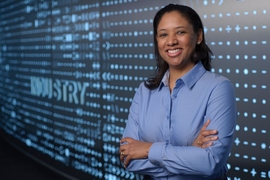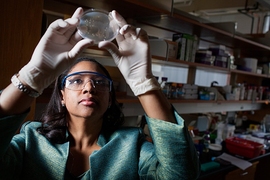Though biofuels have been a part of energy research for decades, their position in the clean energy portfolios of the future is still a hotly debated issue, by scientists and policymakers alike. This contention has allowed other clean technologies, such as wind and solar, to reach a level of deployment that gives them an edge on biofuels in the mainstream. As biofuel technologies still face challenges of feasibility and acceptance, it can seem like the prime window for biofuel development has not yet begun to open — or that it has already closed.
Kristala Prather, an MIT professor of chemical engineering and a biofuels expert, has her own complex views of whether or not the biofuels renaissance is coming or going. On April 25, she gathered a group of undergraduates at the MIT Energy Initiative (MITEI) to have an open dialogue about what the future of biofuels might look like, and what hurdles may need to be overcome.
At the start of the talk, which was part of MITEI’s new Undergraduate Energy Seminar Series, Prather asked her audience to list some pros and cons of using biofuels. On the “con” side, students listed doubts about sustainability, questions of cost-effectiveness, and the ever-present food vs. fuel debate: the idea that bio-matter used for fuel could have been better used for food. Among the potential benefits students listed were energy security and national economic development, positive environmental impacts, and provision of continuous energy supply.
Prather used this conversation as a jumping-off point for a more in-depth look at energy legislation in the U.S. that has, over the past decade, begun to pave the way for biofuels. There are multiple reasons to consider biofuels in our energy mix, she said, most of them represented on the “pros” list the students developed. Her own interest in studying the subject came from the environmental side: “Positive environmental impacts were a big driver for me. When I first got into this field, I had this vision of engineering microorganisms to create new kinds of biofuels,” she said. She wanted to help energy producers move away from fossil fuels while also expanding the field of biofuels beyond starch-based ethanol. What moved her, she said, was “innovation in an intellectual context, and then moving from there to looking at things that can have a positive impact.”
This shift away from ethanol and other starch-based fuels is particularly apropos of the policies Prather discussed. Under the current U.S. energy legislation, a large percentage of the biofuels created need to be non-starch, another way of saying non-food sources. Creating these non-starch fuels has proven difficult for innovators like Prather. She assured students she and her fellow researchers were looking at the bright side. “If you start from zero, anything you make is infinitely better than that.”
At this point, one of the students in the audience interjected: “There’s also the idea that going from zero to 1,” he said, “is always harder than going from 1 to n.” In other words, creating something from nothing is more difficult than improving on something that’s already been made.
“Brilliant point.” Prather looked for the source of the comment and finding him, smiled. “I know you. You took my class.” He nodded.
By way of an answer, Prather began drawing a technology development curve on the blackboard, with time on the x axis and achievement on the y. She noted that undergrads interested in technology research would need to familiarize themselves with this type of graph, especially if they had their sights set on grad school.
“In the beginning,” she said, pointing at the low end of the curve, “you spend a lot of time on the research, and not a lot happens. At some point following, there’s a tipping point where you get a lot of results in less and less time.”
Prather turned back to the audience. “That was part of the driver I had for naming the talk what I did. Is it too late or is it just too early for biofuels? I think it’s too early — we just haven’t spent enough time on the problem yet.”
The MIT Energy Initiative created the Undergraduate Energy Seminar Series to provide students interested in energy studies with lectures and workshops that introduce them to energy studies classes, careers in energy studies, and emerging energy research. Prather’s talk was the final seminar of the 2015-16 academic year. Look out for a new slate of speakers in fall 2016.











